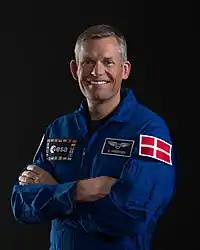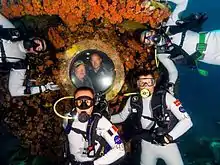Andreas Mogensen
Andreas Enevold Mogensen (born 2 November 1976) is a Danish engineer and ESA astronaut who is best known for being the first Dane to fly in space as part of the European Space Agency's iriss program.[2] Mogensen has also been involved in a number of other space-related projects throughout his career, including working as a test engineer for ESTEC and as a member of the European Astronaut Corps. In addition to his work with the ESA, he has also worked with NASA and other international space agencies. Mogensen returned to space in August 2023 for his second spaceflight to the ISS onboard SpaceX Crew Dragon as the first non-American to serve as a pilot.
Andreas Mogensen | |
|---|---|
 Mogensen in 2020 | |
| Born | 2 November 1976[1] Copenhagen, Denmark |
| Status | Active |
| Nationality | Danish |
| Other names | Andreas Enevold Mogensen, Andy Mogensen |
| Alma mater | Imperial College London (MEng) UT Austin (PhD) |
| Occupation | Aerospace engineer |
| Space career | |
| ESA astronaut | |
Time in space | Currently in space |
| Selection | 2009 ESA Group |
| Missions | Soyuz TMA-18M/Soyuz TMA-16M, SpaceX Crew-7 (Expedition 69/70) |
Mission insignia | |
| Website | andreasmogensen |
Education and early career
He was born in Copenhagen. Mogensen attended primary school at Rygaards International School in Hellerup, where he graduated in 1992.[3] He received an International Baccalaureate from Copenhagen International School in 1995.[4] He then went to the Imperial College London where he obtained an MEng degree in Aeronautical Engineering in 1999. Between 2001 and 2003 he worked as an engineer in the R&D department of Vestas Wind Systems in Denmark. Subsequently, Mogensen earned a PhD degree in Aerospace Engineering at the University of Texas at Austin in 2007. Furthermore, as part of his studies, he spent a semester at the Instituto Superior Tecnico - University of Lisbon in Lisbon, Portugal.[5] Mogensen worked in Germany as an altitude and orbit control system and guidance, navigation & control engineer for HE Space Operations associated with the SWARM mission. He furthermore worked as a contractor for EADS Astrium in Portugal at the Institute for Systems and Robotics. In addition, he stayed in a large number of other countries, including Thailand, Singapore, England, Portugal, Congo and the United States. His position when he was selected by ESA was Aerospace Engineering at Surrey Space Centre, University of Surrey.
Space career
In ESA
Mogensen was selected to become the first Danish astronaut by the European Space Agency in May 2009. He completed initial training and became a member of the European Astronaut Corps in November 2010.
In 2013, Mogensen served as cavenaut into the ESA CAVES[6] training in Sardinia, alongside David Saint-Jaques, Soichi Noguchi, Nikolai Tikhonov, Andrew Feustel and Michael Fincke.
On 10 June 2014, NASA announced that Mogensen would serve as an aquanaut aboard the Aquarius underwater laboratory during the NEEMO 19 undersea exploration mission, which began on 7 September 2014 and lasted seven days.[7][8]
Between September and November 2021, Mogensen participated in the fourth edition of ESA PANGAEA training program.[9] Together with the NASA astronaut Kathleen Rubins, Mogensen went to the Italian Dolomites, to the Ries Crater in Germany and the volcanic landscapes of Lanzarote, Spain.[10] ESA's Pangaea program prepares astronauts and space engineers to identify planetary geological features for future missions to the Moon, Mars and asteroids.[11]

Iriss
Mogensen's mission to the ISS was called "iriss". The mission name was chosen from suggestions received from across Europe. "iriss" had two logos, one to highlight the overall mission and one for the educational outreach activities.

On 2 September 2015, Mogensen was launched with Soyuz TMA-18M to ISS and landed with Soyuz TMA-16M ten days later. He was travelling with another visiting flight engineer, Aidyn Aimbetov. Among the items Andreas brought along were LEGO figures[12] and a poster for Copenhagen Suborbitals.[13]
Because of the short mission duration, Mogensen worked up to 9.5-hour days instead of the 8-hour workdays that are normal on the station.[14] His missions included remote control of a robot on Earth,[15] and filming Red Sprites and Blue Jets lightnings above thunderclouds,[16] directed from Earth.[17] He also tried a new kind of Skinsuit to alleviate back-pain astronauts feel due to the lengthening of their spine and used augmented reality goggles during his maintenance tasks.[14]
Mogensen left the station on 11 September 2015. Sergey Volkov was the ascent pilot (TMA-18M) and Gennady Padalka was the descent pilot (TMA-16M).[18] The crew landed at 00:51 UTC on 12 September 2015, just over three hours after departing the ISS.
Mogensen received the Danish Royal Medal of Recompense for his efforts.[19]
Huginn
In March 2022 he was selected as pilot of SpaceX Crew-7 and is the first European pilot of a spacecraft and the first pilot of a US spacecraft who is not a US citizen. He is also the ISS Expedition 70 commander. The European segment of the mission is called "huginn".[20]
Personal life
He currently lives on the International Space Station, after training for his mission SpaceX Crew-7, which started in August 2023. His pastimes include rugby, mountaineering and diving.
References
- "Andreas Mogensen – den første danske astronaut". Rumrejsen 2015. Archived from the original on October 14, 2015. Retrieved August 27, 2015.
- "Andreas Mogensen: Space Viking". European Space Agency. Retrieved September 3, 2015.
- "Former Rygaards Student Blasts into Space!". rygaards.com. Archived from the original on September 4, 2015.
- (in Danish) Første danske astronaut slog en tur forbi Hellerup Archive
- "Andreas Mogensen".
- Sauro, Francesco; De Waele, Jo; Payler, Samuel J.; Vattano, Marco; Sauro, Francesco Maria; Turchi, Leonardo; Bessone, Loredana (2021-07-01). "Speleology as an analogue to space exploration: The ESA CAVES training programme". Acta Astronautica. 184: 150–166. doi:10.1016/j.actaastro.2021.04.003. ISSN 0094-5765. S2CID 234819922.
- "NASA Announces Two Upcoming Undersea Missions". NASA. June 10, 2014. Retrieved June 24, 2014.
- Bergin, Chris (June 11, 2014). "NEEMO returns with two new underwater missions". NASASpaceflight. Retrieved June 24, 2014.
- "What is Pangaea?". www.esa.int. Retrieved 2021-12-08.
- "Astronaut training in the land of volcanoes – Caves & pangaea blog". Retrieved 2021-12-08.
- "Back to the future – Caves & pangaea blog". Retrieved 2021-12-08.
- "The story behind the LEGO astronauts". iriss mission blog.
- "Good luck, @CopSub (Andreas Mogensen on Twitter)". Twitter. Archived from the original on September 16, 2015.
- "Iriss – A Sprint Mission". ESA.
- (in Danish) http://ing.dk/video/video-saadan-udfoerte-andreas-robotforsoeget-fra-rummet-178545
- (in Danish) http://rumrejsen.dk/nyhed/k%C3%A6mpelyn Archived September 23, 2015, at the Wayback Machine
- "How DMI found giant lightning for Andreas". Danish Meteorological Institute (in Danish). Archived from the original on September 21, 2015. Retrieved September 17, 2015.
- "UK's Major Peake delighted by historic ISS assignment". nasaspaceflight.com. May 20, 2013.
- "Astronaut Andreas Mogensen modtager Den Kongelige Belønningsmedalje i guld med krone og inskription". kongehuset.dk. 16 September 2015.
- "Introducing Huginn". www.esa.int. Retrieved 2022-08-18.
External links
- Andreas Mogensen blogs about space and the life as an astronaut on the science website Videnskab.dk (in Danish) Blog on Videnskab.dk
- Biography Lightsey Research Group
- ESA prepares for the next generation of human spaceflight and exploration by recruiting a new class of European astronauts ESA
- Spacefacts biography of Andreas Mogensen
- Texas Grad Rugby and Rugby Club Konstanz Archived 2021-06-14 at the Wayback Machine Andy's Rugby Teams
- Collection of articles on Ingeniøren (The Engineer)
